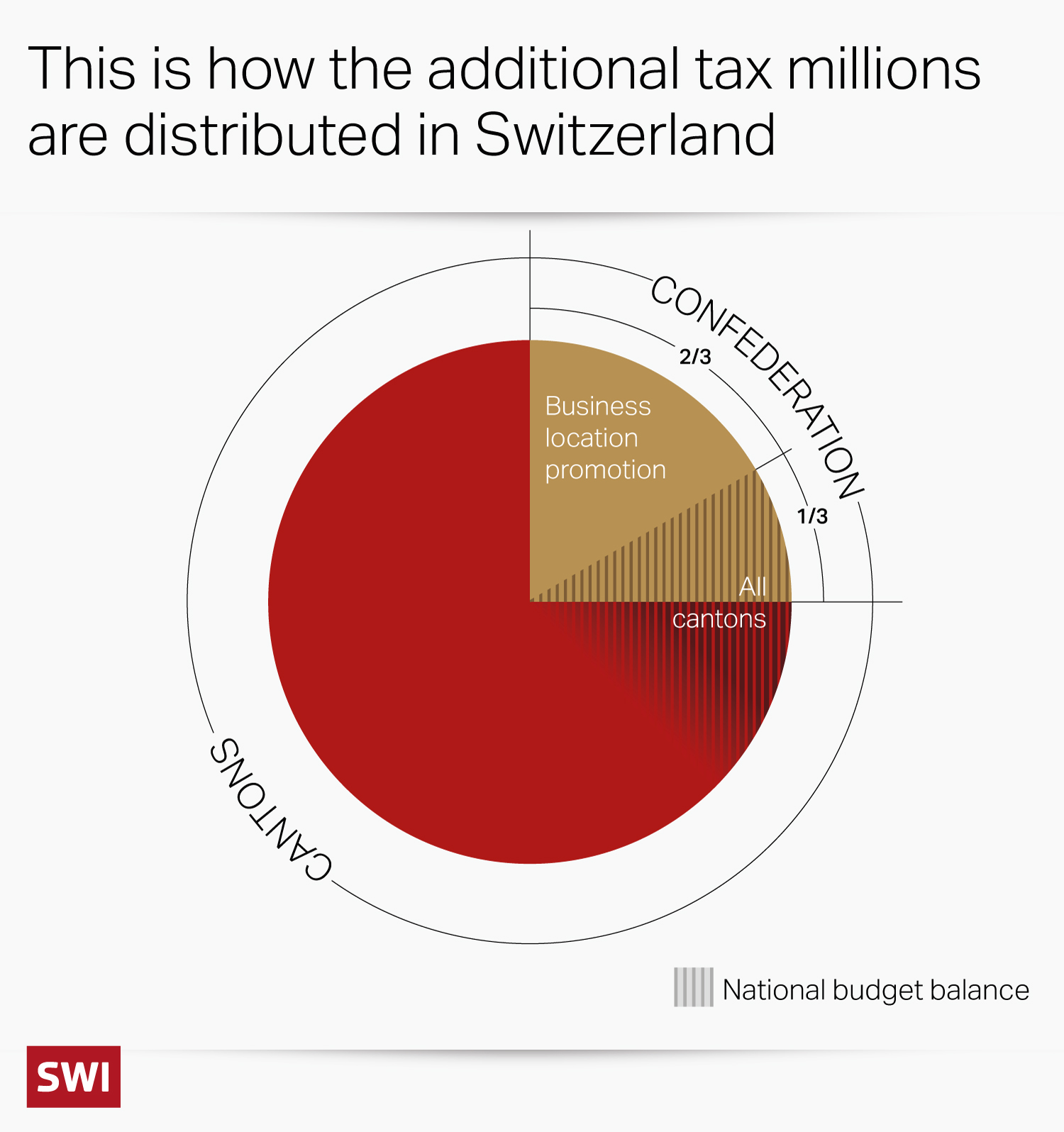
‘Switzerland has shown a lack of solidarity on global tax equity’

A "no" to the OECD minimum corporate tax would clear the way for creating a fairer version of this bill. That’s according to those campaigners who are asking voters to reject the bill in an upcoming referendum. The Social Democrat parliamentarian Fabian Molina explains this position in an interview.
With the minimum 15% corporate tax, the OECD and G20 countries want to achieve global tax equity and combat international tax competition in one swoop. To implement it, OECD member state Switzerland must amend its constitution so the federal government can intervene in the tax sovereignty of the cantons with a “supplementary tax”. Voters will have the final say on June 18.

More
Explainer: the OECD minimum tax vote
SWI swissinfo.ch: The OECD countries want to tax multinationals at the same rate, and Switzerland is going along with it. As a left-winger, you should be cheering. What bothers you about it?
Fabian Molina: The fact that there is an international minimum tax is fundamentally a success. The problem is that in implementing this OECD reform, Switzerland is achieving the opposite of what the OECD had intended. Instead of benefitting the population, it will just help a few large corporations.
SWI: How is that?
F.M.: Switzerland created loopholes in previous tax reforms. One is the so-called “Step Up”, introduced in 2019, which allows hidden reserves to be declared and profits to be taxed at a reduced rate. The other is the capital investment principle, in force since 2011, which allows companies to give their shareholders a share of profits without incurring any tax. This instrument alone cost the state between CHF3.6 billion ($4.06 billion) and CHF4.8 billion from 2011 to 2018, according to government estimates. And these loopholes will not change with the OECD minimum tax. If large corporations have to pay more taxes, they can offset the extra costs by using these two instruments.

More
Saying ‘no’ to OECD minimum tax ‘would be shooting ourselves in the foot’
SWI: Even so, tax revenue is expected to increase by more than CHF1 billion with the minimum corporate tax.
F.M.: That’s just an estimate. But we know that the bulk of this additional revenue will flow to the cantons of Zug and Basel-City. Zug, for example, has already announced that it will use the money to cut taxes for the wealthiest. Corporations are also set to benefit from the so-called location subsidy. Worse still, if the cantons where the corporations are based now get the bulk of the additional tax revenue, that will further fuel tax competition between cantons. And if the additional revenues mainly benefit two cantons, then this is extremely unfair for the population.
SWI: At least the money stays in Switzerland. That should be welcomed by the left, shouldn’t it?
F.M.: The revenues must benefit the population in Switzerland and in the countries of origin. Most of the companies concerned are barely active in Switzerland. They are, for example, commodity companies that transfer their profits from the Global South to Switzerland. This transfer of funds will remain in place. The tax rate of 15% is the lowest possible and it is far too low.
SWI: You argued in parliament for a part of the extra revenue to be channelled back to the Global South. Will you propose that again if voters reject the bill?
F.M.: Yes. As I said, we are not against Switzerland implementing the OECD reform – on the contrary. We fought for a global minimum tax. But global also means that there should be fairness between North and South. The implementation as planned fails to achieve these goals.
SWI: What would you do if voters reject the bill on June 18?
F.M.: First, close existing loopholes. It must be impossible for corporations to avoid taxes by using other instruments. Second, the additional revenue must be distributed fairly across the country. This means that the federal share must be significantly increased. And third, as mentioned before, part of the federal share must flow back to the Global South.
SWI: But in the event of a “no” vote, Switzerland will be under time pressure and will fall behind internationally. Can the country afford that?
F.M.: According to the current timetable, Switzerland has at least one more year [to implement the minimum corporate tax]. In addition, Switzerland would be dropping out in order to better conform to international rules. At the moment, it is only doing the absolute minimum. As things stand, Switzerland is not doing justice to the spirit of the reform, which is global tax equity.
In any case, Switzerland has shown a lack of solidarity on this issue. Together with other low-tax states such as Luxembourg and Ireland, it worked to ensure that the OECD minimum rate of 15% is now very low. Originally, a much higher rate of 21% was proposed. And now Switzerland is trying to appear internationally compliant with inadequate implementation. In this way, the country is maintaining its unique selling point – the lowest rate of corporate tax.
SWI: What would be a fair tax rate for corporate profits?
F.M.: It would have to be 30% or more.
SWI: But the low-tax strategy you criticise has also brought prosperity and social justice to the country. Isn’t that important to you?
F.M.: Switzerland has long relied on immoral business practices – first on banking secrecy. Then, when that no longer worked, Switzerland lured capital via the tax rate and lax laws on money-laundering. The war in Ukraine has revealed how much dirty money from Russian oligarchs that Switzerland has accumulated. This approach is no longer accepted internationally. Switzerland should change its business model for the sake of global justice, but also to be forward-looking.

Translated from German by Catherine Hickley

In compliance with the JTI standards
More: SWI swissinfo.ch certified by the Journalism Trust Initiative



























You can find an overview of ongoing debates with our journalists here . Please join us!
If you want to start a conversation about a topic raised in this article or want to report factual errors, email us at english@swissinfo.ch.